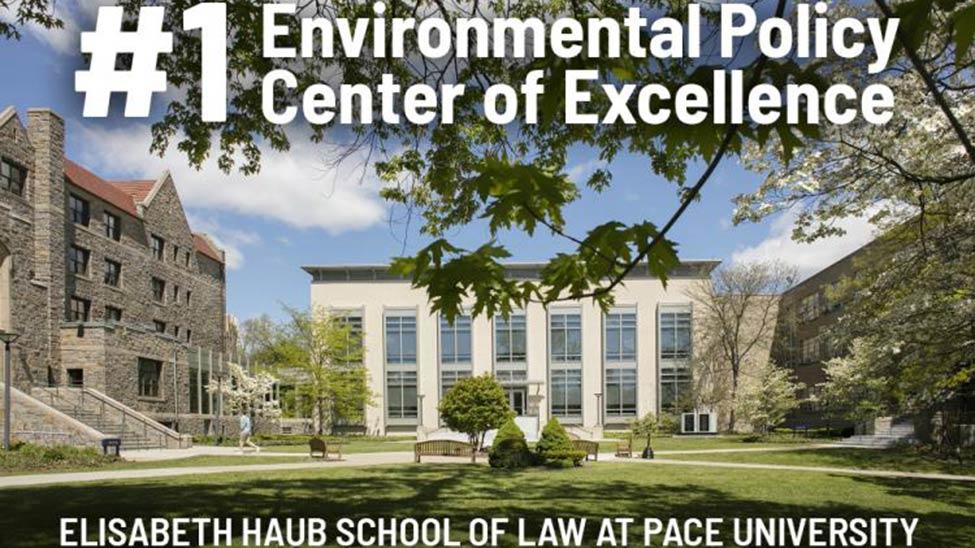
Elisabeth Haub School of Law at Pace University Ranks #1 Among the Top 50 Environmental Policy Centers of Excellence Across the Globe

The Elisabeth Haub School of Law at Pace University is proud to announce that they have been ranked #1 in the top 50 Environmental Policy Centers of Excellence across the globe by the journal of Environmental Policy and Law (EPL). EPL is a global journal that seeks to publish cutting-edge scholarly works that have global significance. It provides a platform to facilitate an ideational understanding of international environmental policy, law, and institutional issues. The purpose of this ranking is to provide an overview of those institutions most active in the domain of environmental policy and law. Various criteria for selection were used in the calculation, including the quantity and quality of articles published in scholarly journals on environmental policy and on environmental law by authors affiliated with these institutions.
“Our environmental law program has a long-standing reputation for being a pioneer in the field of environmental law and continuing to keep ahead of the curve in the field,” said Gilbert and Sarah Kerlin Distinguished Professor of Environmental Law and Executive Director of Environmental Law Programs and Strategic Initiatives Jason J. Czarnezki. “We attract top-notch faculty to our institution and provide our students with the groundwork to be the next leaders in environmental law not just nationally, but globally. Our #1 ranking in the United States and this latest international accomplishment continues to recognize our environmental law program as the best of the best.”
This year, having received the number one ranking in the country for Environmental Law by U.S. News and World Report, makes it the second year in a row, and the third time in four years, that Haub Law has received the number one ranking for Environmental Law. The Environmental Law Program is widely known for signature programs including the Environmental Litigation Clinic, the Food and Farm Business Law Clinic (formerly the Food and Beverage Law Clinic), and the Jeffrey G. Miller National Environmental Law Moot Court Competition. Recently, the program also initiated the Environmental Law and Policy Hack Competition for law schools throughout the country. Last year, the Law School launched the Sustainable Business Law Hub, which will create opportunities for training, policy, and research that addresses global environmental challenges. The Law School is also home to leading centers of expertise, such as the Land Use Law Center, the Pace Energy and Climate Center, and the Global Center for Environmental Legal Studies. The Law School also hosts lectures and panels throughout the year featuring environmental scholars, advocates, and policymakers, and it recognizes leading international environmentalists through the annual presentation of the Elisabeth Haub Award for Environmental Law and Diplomacy, considered one of the world’s most distinguished awards in the field of environmental law.
Haub Law is one of only two law schools worldwide to be a member of the International Union for the Conservation of Nature (IUCN), which provides students with the opportunity to draft memoranda, debate issues, and attend IUCN meetings, including the World Conservation Congress and U.S. National Committee meetings. The Law School is also Co-Secretariat to the IUCN Academy of Environmental Law, helping to nurture environmental legal education and promote the conceptual development of environmental law internationally. Through the United Nations Diplomacy Practicum, students provide assistance to UN country Missions by attending their meetings and preparing research on issues such as climate change, renewable energy, fisheries protection, and forest management. These opportunities provide Haub Law students with the tools they need to be national and international leaders in environmental law.